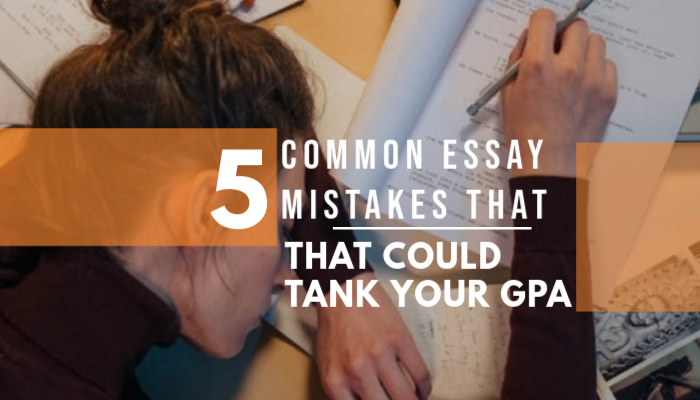
5 Common Essay Mistakes That Could Tank Your GPA
Avoid common essay mistakes and enhance your writing skills. Discover practical tips for better results. Read the article for essential insights!
Read MoreApplying to college is a big deal, and it’s easy to feel overwhelmed by the process. Students spend years preparing for this moment, dreaming of acceptance letters from their top-choice schools. But even the most prepared applicants can trip up if they’re not careful. From small oversights to major missteps, college application mistakes can hurt your chances of getting into your dream institution. This guide dives into the most common pitfalls students face during the college application process and how to steer clear of them. Whether you’re a senior starting your applications or a junior planning ahead, avoiding these mistakes can make all the difference in standing out to admissions officers.
College application mistakes are errors or oversights that weaken your application. These can range from simple typos to missing deadlines or submitting incomplete materials. The college admissions process is competitive, and admissions teams review thousands of applications each year.
Even small mistakes can make your application look less polished compared to other applicants. For example, forgetting to include required documents or failing to tailor your essay to a particular school can raise red flags. The worst mistake? Submitting an incomplete application.
This can land your materials straight in the reject pile, as admissions offices often don’t have time to chase down missing pieces. By paying close attention to details, students can avoid these pitfalls and present their best selves.
Making a mistake on your college application doesn’t always mean instant rejection, but it can hurt your chances. Admissions officers are human, and they understand minor errors happen. However, consistent or glaring mistakes like spelling errors or submitting the wrong essay can signal a lack of effort or care.
For instance, if you send an essay meant for one university to another, it shows you didn’t do thorough research about the institution. This can make admissions teams question your interest in their school.
In some cases, mistakes like missing deadlines or incomplete applications can lead to automatic rejection. The good news? Most errors are fixable if caught early, so triple-checking your work is key to staying on track.
The college application process involves multiple steps, from gathering test scores to writing essays and securing recommendation letters. Each piece of your application materials matters, and overlooking even one part can derail your efforts. Students often underestimate how much time the process takes, especially when applying to multiple schools.
Many schools use platforms like the Common App, which streamlines submitting applications but comes with its own challenges. For example, technical issues can prevent submission if you don’t plan ahead.
Starting early and giving yourself ample time to complete each section helps avoid rushed mistakes. Careful planning ensures you meet all deadlines and submit polished materials that reflect your strengths.
To help you navigate the college application process, here are the 10 most common college application mistakes students make and how to avoid them:
Avoiding these common mistakes ensures your application shines.
The worst college application mistake is submitting an application that doesn’t reflect who you are. This happens when students try to game the system by exaggerating achievements or writing what they think admissions officers want to hear. Authenticity matters in college admissions.
If your essays or activities list feels forced or inauthentic, admissions teams will notice. Another major misstep is missing deadlines, as most colleges have strict cutoffs. An incomplete application or one submitted late often gets rejected without review.
To avoid this, start working on your applications early in your senior year and double-check deadlines for each institution. Showing your true self while meeting all requirements is the best way to shine.
Mistakes on the Common App can range from minor typos to submitting the wrong essay for a particular school. If you catch an error before submitting, you can usually edit your application directly on the platform.
But what happens if you notice a mistake after submission? In most cases, you can’t edit the Common App itself once it’s submitted, but you can contact the admissions offices of the colleges you applied to. Explain the error politely and ask if you can submit corrected materials.
For example, if you uploaded the wrong essay, some schools may allow you to send the right one. Be proactive and honest, as admissions teams appreciate students who take responsibility for fixing mistakes.
Students often ask, “Is the Common App having issues?” or “Why is the Common App not letting me submit?” These problems usually stem from technical glitches, formatting errors, or missing required documents. For instance, if your essay exceeds the word count or contains unsupported characters, the system may block submission.
To fix this, review your application carefully and ensure all sections meet the platform’s guidelines. If you encounter a persistent error, contact Common App support or the admissions offices of the schools you’re applying to. Starting early gives you time to troubleshoot issues without missing deadlines. Always save your work and keep backups of your essays and other materials to avoid losing progress.
When writing college essays, students should steer clear of the “5 D’s” that can weaken their work. These are:
By focusing on originality and clarity, you can write RELATED
System: write compelling college admissions essays that leave a positive impression.
Admissions officers look for red flags that suggest a student isn’t a good fit for their institution. One major red flag is a lack of demonstrated interest. If your application feels generic or you fail to mention why you’re drawn to a particular school, it signals you didn’t do thorough research.
Another red flag is inconsistent information, like grades that don’t match your transcript or activities that seem exaggerated. Spelling errors or sloppy writing also raise concerns, as they suggest a lack of effort. Weak letters of recommendation, those that are vague or lack specifics, can hurt your chances too. To avoid these, double-check your work and choose recommenders who know you well.
Certain mistakes can make your application stand out for the wrong reasons. Submitting an incomplete application, such as missing test scores or recommendation letters, is a quick way to land in the reject pile. Another issue is focusing too much on grades without showing your personality or passions.
Admissions teams want to see well-rounded students who contribute to their community, not just high achievers. Exaggerating extracurricular activities or taking a leadership role just for the sake of your application can also backfire if it feels inauthentic. Finally, submitting essays with spelling errors or generic content can make your application forgettable. Tailor your materials to each school to show genuine interest.
Students often wonder, “Is it bad if my Common App essay is exactly 650 words?” The answer is no, it’s perfectly fine. The Common App sets a 650-word limit, and hitting that mark shows you can express yourself fully within the guidelines. However, every word should count. Avoid filler or repetitive content to meet the word count.
Admissions officers value clarity and impact over length, so focus on telling a compelling story. If you’re struggling to stay within the limit, revise your essay to cut unnecessary details while keeping your voice strong. A well-written 650-word essay can be just as effective as a shorter one if it’s engaging and authentic.
Beyond the Common App, students make several common application mistakes that hurt their chances. One is failing to research schools thoroughly. Applying to a university without understanding its academic programs or values can lead to generic applications that don’t impress. Another mistake is relying on weak letters of recommendation.
If your teachers or counselors don’t know you well, their letters may lack depth, which admissions teams notice. Procrastination is another big issue, as waiting until the last minute often leads to rushed essays or missed deadlines. Finally, neglecting supplemental essays is a missed opportunity to show demonstrated interest. Start early and tailor each application to the specific institution to stand out.

Bad grades can feel like a dealbreaker, but they don’t have to be. If your transcript shows a dip, use the additional information section of the Common App or supplemental essays to explain. Be honest but concise, and don’t make excuses. For example, if personal challenges affected your performance, briefly share the context and focus on how you bounced back. Maybe you took extra courses or worked harder in your senior year to show improvement. Admissions officers value resilience and self-reflection, so framing your story positively can turn a weakness into a strength. Avoid blaming teachers or external factors. Instead, show how you grew from the experience and what you learned.
Once you submit your application, editing it directly is usually not possible, especially on platforms like the Common App. However, if you spot a mistake, don’t panic. Contact the admissions offices of the colleges you applied to and explain the issue. For minor errors, like a typo in your essay, some schools may note the correction without needing a new submission. For bigger mistakes, like uploading the wrong document, ask if you can send updated materials. Be polite and professional, as admissions teams are more likely to help if you’re proactive. To avoid this stress, review your application thoroughly before submitting to catch errors early.
With rising costs and a changing job market, some students wonder if college is worth it in 2025. The answer depends on your goals, but for many, college remains a valuable investment. Beyond academics, college offers networking, personal growth, and access to student activities that shape your future. It’s a chance to explore academic programs, build skills, and prepare for a career. However, it’s not the only path, as trade schools or entrepreneurship are valid options too. When choosing a college, consider factors like affordability, career support, and alignment with your interests. Thorough research and careful planning can help you decide if college is the right choice for you.
Choosing the right college is about more than rankings. Here are five key factors to consider:
Researching these factors ensures you pick a school that fits your needs and sets you up for success after graduation.
Avoiding college application mistakes takes time and effort, but it’s worth it. Start working on your applications early in your senior year to give yourself room to revise and polish. Triple-check your essays, test scores, and required documents before submitting. Ask teachers or mentors to review your materials for clarity and errors. Pay close attention to each school’s application requirements, especially for supplemental essays. Show demonstrated interest by tailoring your essays to each institution’s values and programs. Finally, stay organized, and keep a checklist of deadlines and tasks to stay on top of the process. With careful planning, you can submit applications that make you stand out and boost your chances of acceptance.
Struggling to write a standout college admissions essay? Don’t let common college application mistakes hold you back. Order professional help from AceMyHomework to create a compelling, authentic essay that captures your unique voice and impresses admissions officers. Get started today and boost your chances of acceptance!

Get affordable and top-notch help for your essays and homework services from our expert tutors. Ace your homework, boost your grades, and shine in online classes—all with just a click away!



Fast, secure, and handled by vetted experts.

Avoid common essay mistakes and enhance your writing skills. Discover practical tips for better results. Read the article for essential insights!
Read More.jpg)
The consequences of plagiarism are real, but so is your potential to write something amazing. So, take these steps, trust your voice, and ask for help from Acemyhomework for expert advice and resources tailored to college students.
Read More
Writing an A+ essay in 24 hours is totally possible, even if you’re struggling. Follow these A+ essay tips, stay focused, and use resources from Acemyhomework to guide you.
Read More